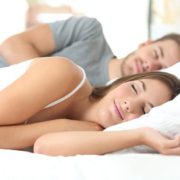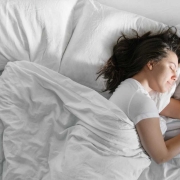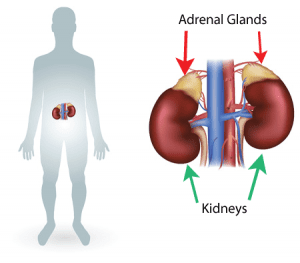Great things happen when we are well-rested: our breath is full, slow, and deep, the digestive system works well, and the body can focus on repair – including reduction of inflammation, tissue repair, and hormone production. In fact, getting regular, restful sleep is the best medicine for improving a health condition or for simply maintaining a healthy lifestyle. But modern living comes with a price. Overbooked, highly stressed, and often running on reserves, as many as one-third of adults in the United States are not getting the quality of sleep the body requires.
Impact of Stress on Body
Let’s face it, stress is a fact of life. Stress is a biological and psychological response that occurs when we encounter a threat that we do not feel we have the resources to deal with. Any number of stressors, such as exams, divorce, illness, the death of a loved one, moving, or job loss, will create a physical response in the body. You may experience an increase in heart rate, an increase in breathing, a rush of energy to the limbs, a decrease in digestive activity (impacting elimination), and the liver is stimulated to release glucose for energy.
This physiological process also referred to as fight, flight, or freeze, is an instinctual survival mechanism controlled by the autonomic nervous system (ANS). When we operate under stress on a daily basis, the heightened activity of the ANS can end up causing more damage than benefits. The key becomes how a person can effectively manage – or downregulate – the stress response, and this is something that can be practiced and developed over time.
Self-Assessment
By answering a few simple questions you can get a good sense of whether the amount and quality of sleep you are getting on average per night is enough. If your answer is “no” to any one of the questions below, it’s a good indicator that your sleep pattern needs adjustment*.
- Do you have a regular bedtime?
- Do you get up at the same time every day?
- Do you sleep the entire night through?
- Do you have a way to downshift or release stress from your day?
- Do you wake up in the morning feeling rested and restored?
*If you are concerned that your sleep pattern indicates a serious problem, please give us a call at 703-532-4892 and ask to speak to a nurse or schedule an appointment.
Preparing for Restful Sleep
Once you’ve identified that your sleep pattern needs improvement, there are several ways to teach yourself how to downregulate the nervous system in order to prepare for a better night’s sleep. This means setting some guidelines for yourself during the day and establishing a nighttime/sleep routine.
During the daytime:
- Avoid drinking caffeinated beverages after noon and exercise should also be completed a solid two hours before sleeping.
- If there are worries on your mind, jot them down in a journal to temporarily release them from your mind. Keeping a running list of “things to do” handy also helps to clear your mind before the evening.
- Another extremely important element to getting restful sleep is managing others’ expectations and honoring your own boundaries. Taking on more tasks than one can handle is quite common, but it can really push us to our limits and cause unintentional stress. By setting some boundaries and staying within those lines as much as possible we can make more time available to decompress from the day’s activities.
In the evenings, aim for the following:
- Avoid food or excessive drink after 7 p.m.
- Avoid caffeine after Noon
- Avoid alcoholic beverages
- Honor your bedtime
- Dim lights & disconnect from technology 2 hours before bed. Yes, 2 hours!
- Arrange for comfort (soft sheets, warm blankets, and comfortable clothing)
- Set the room temperature to one that is comfortable for you (some people sleep better in a cooler room)
- Soothe the nervous system with meditation and stress reduction exercises – for tips, read on!
Stress Reduction
Aside from meditation, there are a number of exercises and other techniques to relax the nervous system before bed that can be done either with a partner or alone.
Just Breathe…
Belly breathing, also called diaphragmatic breathing, can soothe the nervous system. Watch and feel your belly expand with each inhalation. Breathing into the belly, instead of the upper lungs, can slow the heart rate and calm the nervous system. In addition, when your exhale breath is longer than your inhale breath, the heart rate slows down.
Practice inhaling for 2 counts and exhaling for 4 counts and repeat. As your heart rate slows, you may try to do a 4 count inhale and a 6 count exhale. Repeat this 4-5 times at least 30 minutes before bed. Note that your body may respond differently to the breathing, listen to your body and notice what calms your system and practice that.
 Adrenal Hold
Adrenal Hold
This is a soothing partner activity which involves cradling the adrenals to initiate feelings of calmness and relaxation. We have two adrenal glands, located on the top of each kidney. The adrenals are responsible for releasing the hormones cortisol, aldosterone, adrenaline, and noradrenaline that, among other processes, are involved in the fight, flight or freeze response.
Have the receiver sit comfortably in a chair so their partner, the holder, can easily reach their back to gently cradle the adrenals with warm hands (please, no energy work or bodywork). The holder creates a “safe basket” of warmth for the glands and allows the receiver to relax. This can also be done without a partner by using a warm pack for 5 minutes on the area. After a few minutes, the receiver will notice that they start to slow their breathing and may start to feel more relaxed. This is a wonderful way to calm down after a busy day of work and settle into a restful evening.
Triple Warmer Meridian
Within Traditional Chinese Medicine’s perspective on healing, you’ll find the concept of body meridians. Twelve major meridians channel life energy – or Qi – throughout the body, interacting with every major organ system. Good health is an indicator of balance within these energy pathways; likewise, diminished health and illness are indicative of an imbalance that must be corrected.
Triple Warmer is the meridian that controls our fight, flight or freeze response. According to Donna Eden, author of Energy Medicine, the triple warmer impacts the immune system and our ability to manage stress. When it is activated, the body is on high alert. When you practice tracing your triple warmer meridian backward, it can sedate or calm the fight or flight response.
For Triple Warmer techniques based on Donna Eden’s program, click here.
Other Tools to Achieve a More Restful Sleep
Create a bedtime routine to prepare your body for sleep. This may include setting the stage so you are most comfortable and relaxed and ready for sleep:
- Calming fragrances (lavender, chamomile)
- Calming beverages (Organic Chamomile tea, Sleepy Time tea)
- Dimming bedroom lights at least an hour before bed
- Eye bags
- SleepPhones and soothing sounds
- White noise or a fan
- Weighted Blanket – The deep pressure generated from a weighted blanket signals the brain to release serotonin, which in turn naturally calms and relaxes the body, promoting sleep and stress relief. Weighted blankets help calm children and adults with sensory integration disorder, autism, Rett Syndrome, Asperger’s Syndrome, ADHD, PTSD and Restless Leg Syndrome!
Sleep is our birthright and we have more control over it than we may think! Find the methods that work best for you to enjoy better quality sleep and the health benefits that go along with it.
We are here for you, and we want to help.
Our goal is to return you to optimal health as soon as possible. To schedule an appointment please call: 703-532-4892 x2
References
Centers for Disease Control and Prevention: Sleep and Sleep Disorders
AlShareef SM. The impact of bedtime technology use on sleep quality and excessive daytime sleepiness in adults. Sleep Sci. 2022 Apr-Jun;15(Spec 2):318-327. doi: 10.5935/1984-0063.20200128. PMID: 35371396; PMCID: PMC8906383.
Green, M. Cohen-Zion, A. Haim & Y. Dagan (2017) Evening light exposure to computer screens disrupts human sleep, biological rhythms, and attention abilities, Chronobiology International, 34:7, 855-865, DOI: 10.1080/07420528.2017.1324878
Cleveland Clinic: Diaphragmatic Breathing
Ma X, Yue ZQ, Gong ZQ, Zhang H, Duan NY, Shi YT, Wei GX, Li YF. The Effect of Diaphragmatic Breathing on Attention, Negative Affect and Stress in Healthy Adults. Front Psychol. 2017 Jun 6;8:874. doi: 10.3389/fpsyg.2017.00874. PMID: 28626434; PMCID: PMC5455070.


 Adrenal Hold
Adrenal Hold
